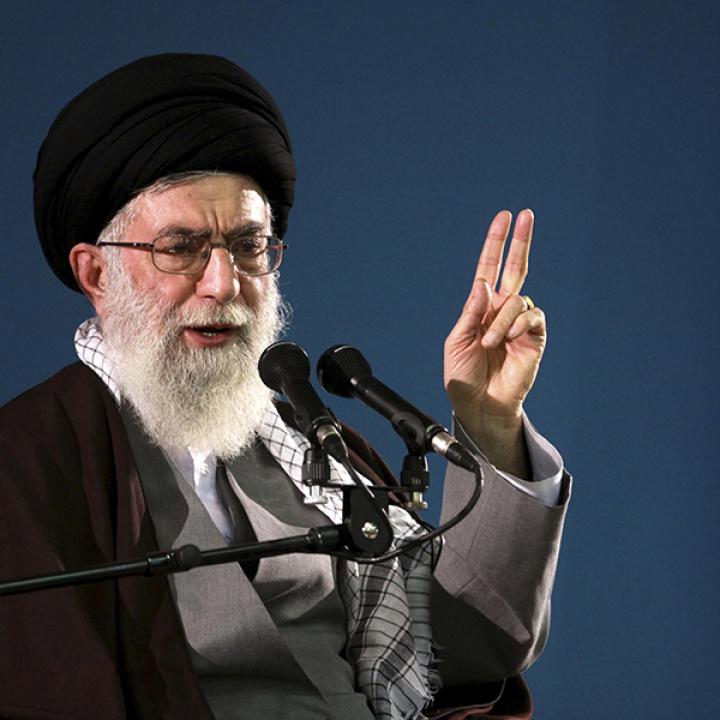
- Policy Analysis
- Policy Alert
Khamenei Lays Out a Framework for Avenging Soleimani and Reentering Talks

In addition to hinting at when (and who) Iran might strike, the Supreme Leader left the door open for eventual talks with the Biden administration, despite throwing water on President Rouhani’s enthusiasm.
On December 16, Ayatollah Ali Khamenei addressed a committee set up to commemorate the death of Qasem Soleimani, the Iranian Qods Force commander killed by a U.S. military strike in Baghdad nearly a year ago. With Soleimani’s family in attendance, the Supreme Leader laid out the regime’s strategy to avenge the attack and graded the severity of various consequences America might suffer for its “arrogance” in the region. Yet he also carefully separated these geopolitical points from the specific revenge he promised Iran would take for the late general.
According to Khamenei, the “million man” protest/funeral held for Soleimani and the subsequent retaliatory missile strike against U.S. military facilities at al-Asad Air Base were “hard slaps” to the enemy’s face. In his view, however, an even harder slap would be to “overpower imperialism’s hollow splendor” using “soft power”—a nonkinetic mission that he assigned to Iran’s youth population and scientific elite. And for the next step up the ladder of escalatory slaps, he predicted the expulsion of all Americans from the region, which he said would require full effort and resistance from the entire Middle East. He did not set any timetable for achieving these lofty goals, however.
Khamenei also explicitly promised “revenge” against those people who ordered and executed Soleimani’s killing. When determining which U.S. officials are responsible for making kinetic decisions in the region, Iranian officials usually ascribe them to the president, his national security staff, the Pentagon, and U.S. Central Command. Regardless of where the blame is ultimately laid in this case, Khamenei declared that Iran’s revenge would come “at its own time and place...whenever the opportunity comes. We are waiting for the right time.”
For all its harsh language, this particular speech did not explicitly state that Iran would use its proxy groups or other means to escalate the situation and force the United States out of the Middle East. To the contrary, Khamenei emphasized the soft power “slap” as perhaps the most appropriate response at present. He also called for expedited technological, scientific, and military advances to bolster Iran’s deterrent strength against the enemy, further suggesting that now may not be the best time for a wider confrontation.
Regarding potential negotiations with the incoming Biden administration, Khamenei implicitly ordered continuity in Iran’s foreign policy—an apparent note of caution to President Hassan Rouhani and other figures who have increasingly advocated swift talks with the new U.S. leadership. As part of this warning, Khamenei urged officials not to put their hopes on any significant change in Washington and not to trust any of Iran’s “enemies.” The latter label was applied to both America and “the three European countries who committed the utmost wrongdoing...toward the Iranian nation”—meaning Britain, France, and Germany. Such remarks were especially telling because they came the same day that Rouhani expressed his certainty about the Biden administration returning to the nuclear deal and ending the sanctions.
Although Khamenei strongly recommended against negotiations with the United States at this stage, he did outline some implicit ground rules for potential future talks. By criticizing Iran’s internal rifts and calling for a united voice among different factions, he was essentially saying that once the regime decides on a path regarding the nuclear issue, everyone will need to fall in line and support it. Even so, the run-up to Iran’s May presidential election will likely see a great deal of mixed, often confusing messaging on the subject of negotiations and sanctions.
Farzin Nadimi is an associate fellow with The Washington Institute, specializing in the security and defense affairs of Iran and the Gulf region.



